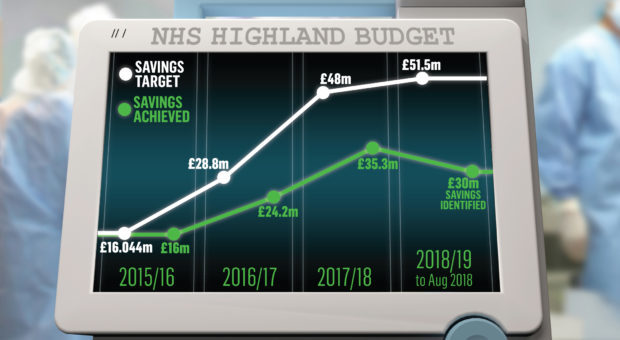A powerful watchdog has voiced “serious reservations” over embattled NHS Highland’s financial woes.
North health chiefs are facing a black hole of £22 million and have asked the government to bail them out for a third time in five years.
In a damning report issued yesterday, Audit Scotland expressed doubts that the board would balance the books by 2021.
>> Keep up to date with the latest news with The P&J newsletter
Auditor General Caroline Gardner said NHS Highland faces “significant financial challenges” and cast doubts over “their ability to make the changes that are needed to achieve financial balance in future”.
She added: “There is still a degree of risk and uncertainty around actual delivery of the savings planned, particularly given the board’s inability to deliver savings in these areas in prior years alongside recurring savings.”
Just a week after bullying claims were made about the staff culture, Ms Gardner added that financial success will be based on good working relationships within the authority.
The report also suggests the financial position of NHS Highland is having a detrimental effect on healthcare.
She said: “Although performance for certain standards is better than the Scottish average, over time performance is declining.”
The report outlines reasons loans, called brokerage, have been required from the Scottish Government. The first loan in 2014/15 was £1.5 million, said to meet the rising cost of acute services at Raigmore Hospital in Inverness, it was paid back the following financial year.
In 2017/18, NHS Highland asked for £15 million: £9.2 million for acute services in Raigmore, £6 million for adult social care services, £2.8 million for prescribing drugs at a higher cost, and an extra £3.6 million for medical pay to meet the rising costs of locums.
In August 2018, the shortfall was said to be between £19 million and £22 million, with the auditor telling the Scottish Government loans were likely to be required for the next three years.
Ms Gardener said: “It is increasingly likely that it will need further brokerage beyond 2018/19 to support the board to achieve in-year financial balance over the next three financial years.”
Of the £52 million savings required in 2018/19, only £30 million had been identified by August 2018, the figures caused the chief auditor concern. She said: “There is still a degree of risk and uncertainty around actual delivery of the savings planned, particularly given the board’s inability to deliver savings in these areas in prior years alongside recurring savings.
“Based on the financial information as at August 2018 the board would require brokerage of £22 million.
Ms Gardner concluded: “The board faces continuing challenges that the savings identified and delivered will be one off in nature contributing to the long term difficulties in ensuring financial sustainability.
“The agreement of the financial recovery plan with the Scottish Government will be critical given the scale of the pressures facing the board alongside longer term service redesign.
“Recognising the board’s current capacity, it is difficult to foresee the board achieving a breakeven financial position within the three years planned. In particular, service redesign and new models of care will be required which will take time to consult on, and then implement.
“It is important that the board puts in place an action plan accompanied by the necessary capacity and resources to deliver it, in order to address the issues the board are facing, whilst recognising that the necessary change will take time to implement.
“It is anticipated the financial challenges the board faces will deteriorate before improvement can be achieved.
A spokeswoman for NHS Highland said: “NHS Highland’s financial challenges have been widely reported and we continue to work closely with the Scottish Government as we develop plans to return to financial balance.”
